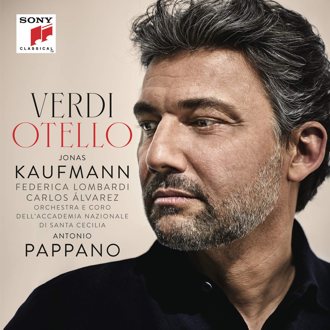|
Jonas Kaufmann impresses with his finely judged
phrasing, psychological acuity and seductive swagger
|
|
|
|
|
|
The Classic Review, June 24, 2020 |
| David A. McConnell |
|
|
|
Review: Verdi – Otello – Kaufmann, Pappano (2020) |
|
|
|
|

Studio produced opera recordings are relatively rare in today’s
market, so kudos to Sony Classical for investing in this new
release. Doubly so, because this is Sony’s second go at the work
with this tenor and conductor: in 2018 they released a DVD
featuring Kaufmann with Pappano conducting forces of the Royal
Opera House, Covent Garden. That performance received
considerable acclaim, so one is right to wonder why Sony decided
to re-record the opera under studio conditions. (The answer is
revealed in the liner notes). And more to the point of this
review, is this new CD markedly different (and better?) than the
earlier recording?
The DVD performance is exceptionally
fine, featuring consistently beautiful singing and an
accompanied of passionate urgency by Pappano and his pit.
Kaufmann’s earlier performance is keenly intelligent, though, in
comparison to Jon Vickers’s reading, Kaufmann offers a more
limited emotional range. His Desdemona in the DVD version,
Italian soprano Maria Agresta, is more problematic. Her sound is
beautiful, but too careful and studied. A lack of chemistry
between the two is more apparent when comparing Vickers and
Mirella Freni in Karajan’s recording. And while the orchestral
playing is technically immaculate, the pursuit of that
correctness sometimes leaves one admiring the sound rather than
engaging with the emotions of the story.
These issues are
not found in the new recording: opening with a visceral storm
scene, the listener is immediately drawn into the citizen’s fear
as they watch Otello’s ship struggle to safety. Orchestra and
chorus are sensational, and Pappano drives the music inexorably
forward. Kaufmann’s initial entrance (track 2) is more striking
than in the earlier recording: his deeply burnished coloring and
stentorian delivery conveying Otello’s charismatic authority.
More importantly, Federica Lombardi’s Desdemona is a fully
fleshed out, multi-dimensional character, and her many
interactions with Kaufmann ring emotionally true. Sample “Già
nella notte densa” (CD 1, track 9): achingly beautiful strings
set the scene, the intimacy between Otello and Desdemona
touchingly conveyed through the varied colors employed by both
singers.
How differently their interaction sounds in the
third act’s public accusation scene (CD 2, tracks. 10-14).
Lombardi completely conveys Desdemona’s wounded pride and
genuine confusion at Otello’s abusive treatment, while
Kaufmann’s fine acting ensures we feel Otello’s descent into
madness. The ensemble singing in “Quel innocente un fremito”
(track 15), which presents several conflicting ideas
concurrently, is an absolute thrill.
Lombardi’s “Ave
Maria” is innocently sung (track 20), and Kaufmann’s emotional
swing between raging jealously and the realization that he
murdered an innocent Desdemona, is heart-breaking. Carlos
Álvarez’s portrayal of Iago, the aggrieved, treacherous schemer,
is chilling.
Sony’s engineers provide a natural,
wide-ranging and unrestricted bloom that never sounds congested,
even at the largest climaxes. The liner notes are both
interesting and problematic: interesting in how they describe
Verdi’s reticence in writing the work, as well as Kaufmann’s
patience in tackling the role; problematic because the offer
little discussion of the music or its masterly libretto, which
is given English, German and French synopsis but no full
translation, at least not in the booklet The Classic Review has
been given. Translations are an absolute necessity to full
enjoyment and understanding of opera. It seems like a disservice
to send international buyers of this release to the internet for
a full libretto translation.
In all other ways this is a
first-class production, and certainly belongs among the upper
echelon of Otello recordings, especially those produced in the
last 30 years. Recommended.
|
|
|
|
|
|
|
|
|
|
|
|
|
|
|